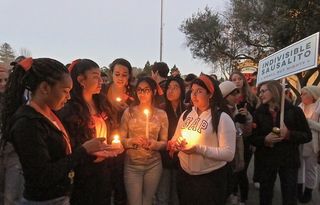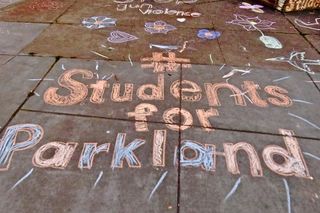Optimism
The Parkland Survivors’ Message of Hope
5 reasons to believe that the kids are alright.
Posted February 24, 2018
- Kids nowadays, right?!
- There is no hope for the future!!!
- I’m scared to see what the world looks like when they take over!!!
- Why, back when I was a kid ...
And so forth.

There seems to always be a skepticism among adults in a given culture regarding the capabilities of the next generation (see Americans on Sex and Sex Health Survey, 1998; Eisner, 2005, for examples). The next generation is often seen as less moral, less responsible, and less community-centered compared with prior generations. You can think of it as the old:
“Back when I was a kid, you knew the value of a dollar! And you never talked back! And you ate what you were served! And you had respect for adults!” And so forth.
Parents in the 60s thought this about the next generation — as did parents of the 70s, 80s, 90s, and 2000s. And I promise you that if you talk to parents of teens today, you are very likely to get this same earful.
Sure, societal details really do change over time and there may be some reasons for concern. The high levels of cell phone use and communication that happens “behind screens” gives genuine reason for worry. And there does seem to be a rise of mental health issues in the next generation as well. And these points are, without question, cause for concern (see Twenge, 2017). But there is more to the story.
Have We Failed the Next Generation?
Make no mistake about it: The unnecessary slaughter of 17 people in the high school in Parkland, Florida on Valentine’s Day showed us the very worst of the human condition. The fact that such a situation can even possibly transpire in my society makes me feel like the current generation of adults — including me and probably you — have failed the next generation in a profound way. There are all kinds of things that we can think of that could have prevented that tragedy (tougher gun laws, more proactive vigilance on the part of community members, a mental health system that actually helps kids who are out on the margins, etc.). But we have collectively failed to have implemented any of those needed societal changes prior to Parkland.
I recently attended a community meeting about the gun-violence issue, and much of the content of the meeting depressed me. Several high school students were in attendance - and they spoke about how stressful the regular lockdown drills in the high school are. Apparently, due to the increase in school shootings, schools in New York State are now required to hold four lockdown drills a year. Drills that scare the heck out many of our kids. Drills that scare teachers by reminding them of the grim realities of our world. Drills that remind parents like me that all of my efforts to help address this national crisis regarding gun violence has, so far, been about like throwing a pebble into a black hole. As long as schools need to hold regular lockdown drills, to my mind, we have failed as a national community to provide for the basic safety of the next generation. And, of course, this is a sobering thought.
Parkland, Florida and Reasons for Optimism

But you know, much of what has come out of Parkland gives us cause for optimism regarding the next generation. The survivors famously started taking action and organizing.
Consider the following:
- Several of the survivors started commenting on social media, letting their elected officials know that thoughts and prayers were not appreciated by so many of these kids who were in the school that day. And hearing this statement from these kids who were on the front lines, of course, must give our elected officials pause.
- They organized a town hall with their senator, Marco Rubio, and they publicly gave him an earful about their perspective on things. They want gun control now, and they stood up to a United States senator in front of the whole world and they said that.
- They are currently organizing a large-scale national movement against gun violence slated for the morning of March 24. And the logistics of this event are being planned and implemented by people across our nation as I type. Most adults I know can’t organize their calendar for the next week. I can barely find matching socks on most days. Think about that.
- They played a lead role in getting several major corporations in the US to cut relations with the NRA, an organization that is considered, by some, to play a major role in obstructing gun-law reform in our nation for decades.
- Their communications with the media were so eloquent and powerful that many of them were accused of being paid actors. LOL. You go, kids.
Bottom Line
Hey, next time your teen leaves a plate in the living room or forgets his or her backpack on the school bus or says something rude at the dinner table, etc. I say remember this: You weren’t perfect as a teen either. Be forgiving and be supportive.
While there is a general tendency for adults in a community to be skeptical of the next generation, every now and again evidence that justifies a reason for optimism in the next generation stands right before one's nose.
Here is to the survivors of Parkland – a truly inspiring group of kids. If you are worried that change in this country is impossible, I say look at the survivors of Parkland. And smile. If these kids can pull off all of this, then I think there’s hope for the future. As The Who sang more than 50 years ago: The kids are alright.
References
“Americans on Sex and Sexual Health Survey” sponsored by the Kaiser Family Foundation and ABC Television, conducted by Princeton Survey Research Associates, 1204 adults nationally, April 24 – May 10, 1998.
Eisner, S. P. (2005). Managing Generation Y. S.A.M. Advanced Management Journal, 70, 4-15.
Twenge, J. (2017). Why Today’s Super-Connected Kids Are Growing Up Less Rebellious, More Tolerant, Less Happy--and Completely Unprepared for Adulthood--and What That Means for the Rest of Us. New York: Simon and Schuster.


